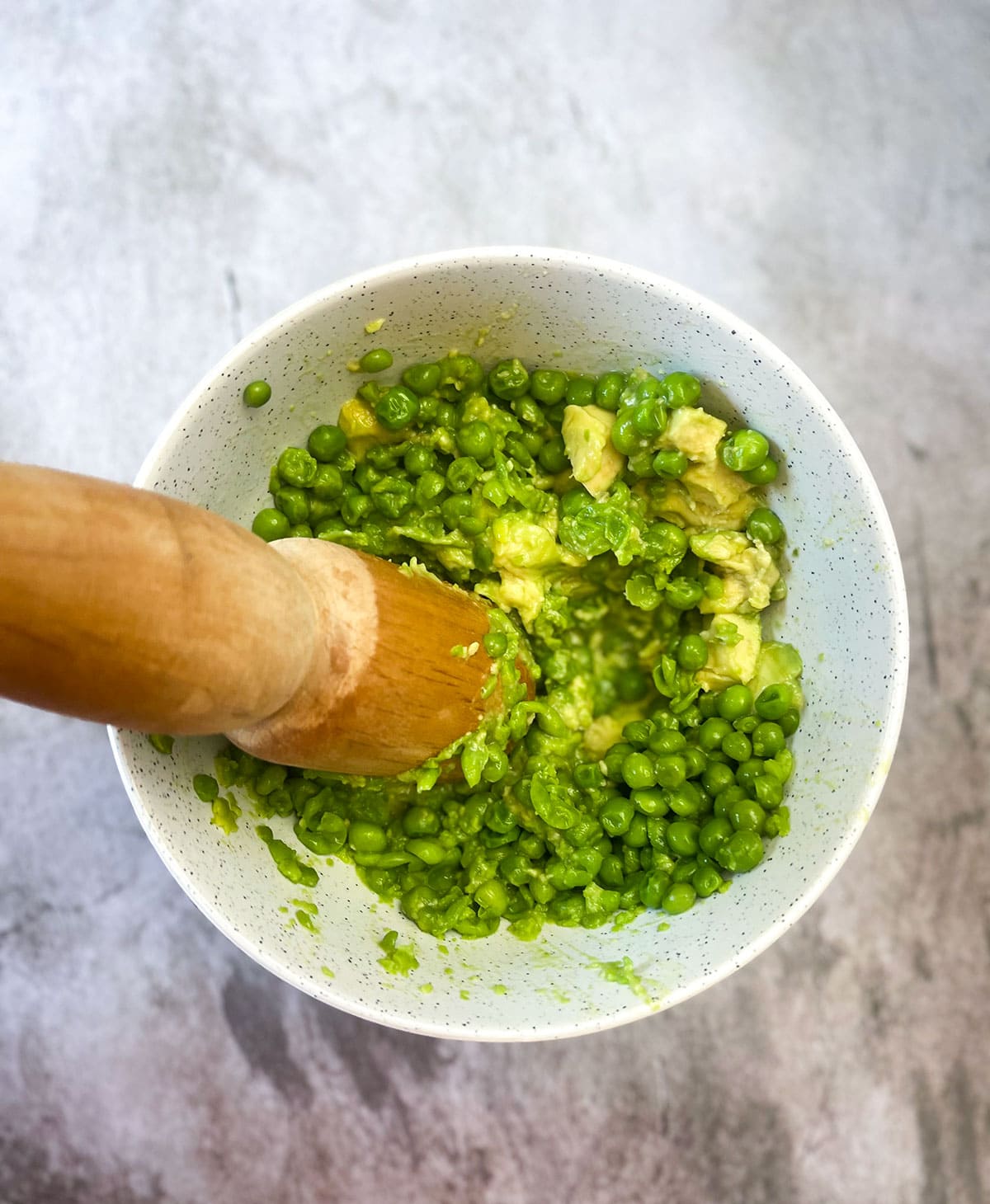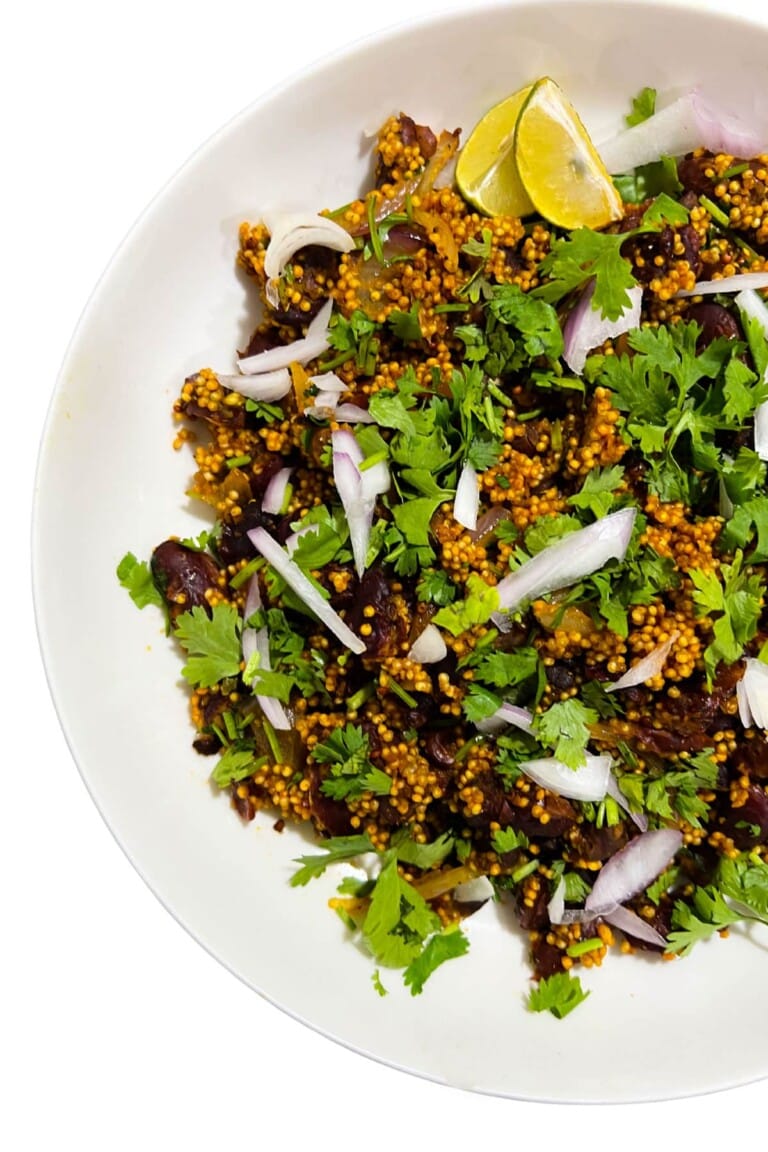Avocado and Peas Baby Food
This Avocado and Peas Baby Food recipe is packed with protein and nutrients. This recipe is easy to make and is delicious. It’s a perfect first food for your baby!
Are you looking for healthy baby food recipes? Or maybe you want to start introducing your little one to different foods but aren’t comfortable with the thought of making your own? I’ve been thinking of sharing incredible baby food recipes that will especially be really helpful for new moms. Additionally, you will also learn here valuable information about healthy foods for your baby.
I decided to make my own baby food after a lot of research when our son was born. For me, the most important thing was to find something that was healthy and an easy way to start weaning him on solid foods. So the first recipe I tried was “Avocado and Peas baby food.”
This fruit baby food recipe is so easy to make, healthy, and wholesome. Avocado is a great fruit that babies love very much. When mixed with peas, the taste will be sweet and yield a perfect flavor your baby will love. You’ll never go back to store-bought stuff again.
Check out, Are Avocados Good For You? How To Grow Avocado From Seed? and How To Freeze Avocados?
Why You’ll Love This Recipe?
- Because of its nutritional profile! Peas and avocados are great for your child as they are both healthy. Avocado contains potassium, magnesium, vitamin C, and E. It also keeps your skin toned and hydrated. – Little peas are beneficial for supplementing calcium as well as iron content in the body which promotes healthy bone development in growing toddlers.
- It’s quite simple to make!
- The avocado gives the baby food a creamy texture, while the peas add some sweetness.
- It goes nicely with a variety of flavors.
- This recipe can be served as an addition to cereal or as a meal on its own.

How To Make Avocado and Peas Baby Food?
Making Avocado and Peas Baby Food is quite easy. You can start with this recipe and then go on to try other combinations of vegetables with fruits.
Ingredients
- ½ avocado
- ½ cup green peas, fresh or frozen
Directions
- Rinse peas, and add to a small pot over medium-high heat. Add water, about 1-inch above the peas and bring to a boil, reduce heat and cook for 5 minutes.
- Drain peas and cool slightly. Place the peas into a mortar and pestle, food processor, or blender with the avocado. Process until smooth. Mix with water or breast milk for the desired texture.

Pro Tips
- The best way to make baby food for your little one is to avoid adding salt, sugar, or other additives.
- You can also add other ingredients such as olive oil, sweet potato, or cooked brown rice. If your baby is older than 6 months, you can add garlic and cilantro for more flavor.
- The amount of water or breast milk you add depends on how much puree your baby needs. You’ll know when your baby has had enough puree when their cheeks fill up like a chipmunk’s!
- As with any other recipe, the key to making great Avocado and Peas Baby Food is using fresh ingredients with no artificial flavors or colors. If you can find organic avocados and peas, that would be ideal.
- When avocados are picked from their tree, they begin to ripen. If you want some rock-hard avocadoes to ripen rapidly, throw them in a brown paper bag alongside an apple or banana. The fruit will emit ethylene gas, which accelerates the ripening process. If you have some avocadoes that are already ripe but want to keep them for a little longer, putting them in the fridge will slow down the ripening process.
- You can make it in small batches or make a large batch of baby food to freeze for future use.
How to Store Avocado and Peas Baby Food?
Avocado and peas puree can be kept in the fridge for 3-4 days or frozen for 3 months. Make sure not to add milk or water to it while storing.
It is important to note that an avocado that has been cut open may turn brown quickly in the refrigerator; therefore, freezing it may be your best alternative.
If you wish to freeze, I recommend using clean silicone ice cube trays or freezer-safe jars because it is easier to defrost smaller portions for feeding babies.
Frequently Asked Questions:
Is Avocado Good For Babies?
Yes. Avocado is a common first food for infants, and it is easy to see why. In addition to being easy to cook, this fruit is packed with fiber and healthful fats that are essential for a baby’s digestive and brain development.
Avocados are rich in growth-promoting B vitamins, including B6 and folate, as well as vitamin E and zinc, which boost immunological function. Avocado’s healthful fats make it a wonderful oil choice as well, though because it’s expensive, it’s best used occasionally.
Avocados come in a variety of sizes and skin textures, with the smaller Hass avocados being the most common. Avocados have a similar dietary profile, albeit larger, green-skinned varieties have significantly less fat and are hence marketed as “lite” avocados. Choose avocados with no bruising and a slight softness when gently squeezed, regardless of variety.
When Can Newborns Eat Avocado?
Avocados can be given to a baby as soon as he or she is ready to eat solids, which is often about 6 months. Avocados are a great first food because they are soft and full of nutrients.
Do Avocados Constipate Babies?
According to recent studies, avocados do not cause constipation in babies. In reality, they’re abundant in fiber, both insoluble and soluble, and they’ll usually help you keep your digestive system in good shape.
Are Avocados A Choking Hazard For Babies?
Avocados are typically soft and easy to chew for babies. While ripe avocados are safe for you and your kid, unripe avocados pose a greater risk to them. The finest way to serve avocado is mashed or in short pieces. Make sure to pick an avocado that is ripe, soft, and the skin is easy to press into when buying one for your child’s first avocado meal! A mature avocado has a deeper green tint and bumpy skin.
Is Frozen Avocado Good?
Yes! For quick access to infant food, I recommend freezing avocado. You may also add frozen avocado cubes to the puree to increase the healthful fats and creaminess.
What Can I Mix With Avocado For Baby Food?
Avocados are an excellent source of healthful fat and have a mild flavor, making them extremely versatile. Chicken, yogurt, summer squash, and other fruits, such as banana, apple, peach, mango, and pineapple, go particularly well with them.
How many avocados Should I Give My 6-Month-Old?
As long as other foods are included on the menu, a six-month-old can consume roughly 2-4 tablespoons per day. A baby of this age should consume approximately 3-4 tablespoons of food every day.
Do I Need To Cook Avocado For The Baby?
Avocado does not need to be cooked for newborns. Cooking gradually depletes fiber and nutrients, which you want to maintain.
Can Avocado Cause Allergy?
Avocados are one of the least allergenic foods available. The lack of enzymes (and bacteria) essential for optimal avocado digestion is most likely the cause of newborns’ reactions to avocados. When the gut microbiota matures and becomes more diversified, this usually fades away.
People who are sensitive to tree pollen and latex are the only ones who have a chance of having a reaction to avocados. Avocado proteins are structurally comparable to natural rubber latex proteins.
Are Peas A Good First Food For Babies?
When it comes to green vegetables, peas are among the greatest first baby food for babies to try because they have a unique texture and flavor but aren’t bitter. When it comes to your baby’s early growth, numerous vitamins and minerals are found in abundance in the humble pea.
Do Peas Constipate Babies?
Peas are high in soluble and insoluble fiber, which helps to keep your baby’s stool soft and moving. This makes passing easier and faster without causing pain.
Are Peas Good For 6-Month-Old?
Peas have a bright green hue and a lovely sweet flavor that babies may like. With a baby-sized spoon, mash steamed or boiling warm peas with some water or milk and serve them to your baby. Your kid can eat these peas when he or she is 6 months old.
Can Peas Upset A Baby’s Stomach?
If your baby eats foods with a lot of fiber, like peas, or sweetcorn, don’t be shocked if they show up in her nappy the next time you change it. Short-term, minor stomach problems are usually nothing to be concerned about. Some babies have stomach problems after they start eating solids because they are allergic to certain food or foods.
Other Related Articles

So this one’s for you and your baby. I hope that you and your little one will enjoy this recipe! If you’ve learned something from this post, please leave a comment to let me know!
If you enjoyed this Avocado and Peas Baby Food and would love to see more, join me on Youtube, Instagram, Facebook & Twitter!
Get discounted copies of my cookbook here.
Fortunately, because of the Ads on our website, readers and subscribers of Healthier Steps are sponsoring many underprivileged families.
Want to Save This Recipe?
Enter your email & I’ll send it to your inbox. Plus, get great new recipes from me every week!
By submitting this form, you consent to receive emails from Healthier Steps.

Avocado and Peas Baby Food
Ingredients
- 1/2 cup green peas fresh or frozen
- 1/2 medium avocado peeled, pitted
Instructions
- Rinse peas, and add to a small pot over medium-high heat.
- Add water, about 1-inch above the peas and bring to a boil, reduce heat and cook for 5 minutes.
- Drain peas and cool slightly. Place the peas into a mortar and pestle, food processor, or blender with the avocado.
- Process until smooth. Mix with water or breast milk for the desired texture.






